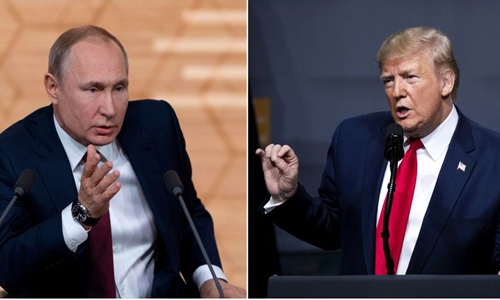US, Russia start nuclear arms talks
Source:AFP Published: 2020/6/22 17:43:40

Xinhua file photos of Russian President Vladimir Putin and US President Donald Trump
The US and Russia met Monday in Vienna for talks on their last major nuclear weapons agreement against a backdrop of growing tensions and differences over whether they see any value in arms control at all.
US President Donald Trump has already scrapped several treaties with Russia - on overflights and on intermediate-range nuclear forces.
US Ambassador Marshall Billingslea and Russian Deputy Foreign Minister Sergei Ryabkov nonetheless discussed the future of the New START treaty, which was agreed in 2010 and expires in February 2021.
That leaves very little time to renew a complex deal, especially with a November presidential election looming.
The current treaty limits each side to 1,550 deployed nuclear warheads.
Speaking over the weekend, Ryabkov played down prospects when he said that while it would be "correct and logical" to agree to an extension, the future of the world was not solely dependent on it.
The deadlock over New START and the demise of other nuclear arms control treaties "suggest that the era of bilateral nuclear arms control agreements between Russia and the USA might be coming to an end," said Shannon Kile of the Stockholm International Peace Research Institute.
According to the institute's latest research, Russia has 6,375 nuclear warheads, including those that are not deployed, and the US has 5,800.
Russian political analyst Fyodor Lukyanov said there was no reason to expect any progress in Vienna.
"The Trump administration has rejected nearly all the restraints linked to the treaties agreed in the past," Lukyanov said.
AFP